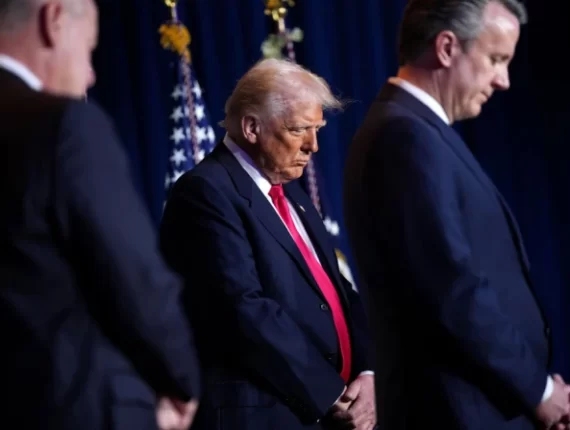

President Donald Trump participates in prayer at the National Prayer Breakfast sponsored by the The Fellowship Foundation at the Washington Hilton on Feb. 6, 2025, in Washington, D.C. (Credit: Andrew Harnik/Getty Images)
The United States is a beacon for religious freedom. That’s a regrettably rare thing around the world. Pew Research’s 2022 Report on Government Restrictions on Religion showed that restrictions in 198 countries and territories peaked in 2022.
President Donald Trump’s second term thus presents a unique opportunity to cement his legacy in championing global religious freedom. “You shouldn’t have to leave your faith at the door of your people’s government, and under President Trump’s leadership, you won’t have to,” Vice President JD Vance said during the International Religious Freedom Summit last week in Washington.
Protection of religious freedom was a core tenet of Trump’s first-term foreign policy. In his remarks to the United Nations General Assembly in September 2019, he reaffirmed that “religious freedom is a fundamental right”. His efforts received bipartisan support in Congress.
The first Trump administration built on the foundation set by the International Religious Freedom Act of 1998 and launched a series of unprecedented initiatives to support persecuted religious minorities, advocate religious freedom in international forums, and maintain a strong stance against religious persecution in countries such as China and Iran.
In 2018, for example, the State Department established the International Religious Freedom Ministerial and held the historic and first Ministerial to Advance Religious Freedom. The event was followed by ministerial meetings held in 2019, 2020, and 2022. These were designed to bring together religious leaders, advocates, and government officials from around the world to discuss and promote religious freedom. They served to elevate the importance of religious freedom on the global stage and reinforce U.S. leadership in defending this fundamental human right.
Congress also acted. One of the most prominent bipartisan legislative actions was the passage of the Uyghur Human Rights Policy Act in 2020. This act aimed to address China’s treatment of Uyghur Muslims in its Xinjiang region, including forced labor, surveillance, and mass detentions. The legislation introduced sanctions on Chinese officials responsible for human rights abuses.
Also in 2020, the Falun Gong Protection Act was introduced in Congress to highlight concerns over China’s persecution of Falun Gong practitioners. The bill had bipartisan backing, with lawmakers advocating action over the Chinese government’s human rights violations. In addition, several U.S. lawmakers from both political parties have expressed support for Shen Yun Performing Arts. Shen Yun is not just an arts group tied to the Falun Gong. According to its leaders, it is also a living artistic expression of a spiritual and cultural heritage that the Chinese Communist Party seeks to eradicate.
Other examples abound.
The Iran Human Rights and Hostage-Taking Accountability Act was bipartisan and passed with wide support in 2018. It aimed to hold the Iranian government accountable for human rights abuses, including the persecution of the Baha’i community, religious minorities, and others. In 2019, Congress passed the Elie Wiesel Genocide and Atrocities Prevention Act, which aimed to strengthen U.S. efforts to prevent genocide and other atrocities. The law had broad bipartisan support and was particularly focused on protecting religious and ethnic minorities, including Christians, Yazidis, Sunni minority groups, Shia minority groups, Alawites, Bahai’s, and Jews in areas including Syria, Iraq, and Iran.
Building on these remarkable achievements, the new Trump administration could continue to advance global religious freedom and take further steps in supporting religious minorities around the world. The political change in Syria, for instance, requires the U.S. to ensure that minority faith groups — Alawites, Christians, Shiites, and others — finally enjoy religious freedom. In addition, the Trump administration should redouble efforts to protect Christians in North Korea, other religious minorities in Iran, and Christians, Uyghurs, Tibetans, or Buddhists in China.
A comprehensive strategy to combat religious persecution and defend religious freedom abroad, ensuring that U.S. foreign aid, diplomacy, and other international efforts prioritize the protection of religious freedoms will advance global peace and stability, strengthen democratic principles, and counter extremism.
It will also cement Trump’s legacy of global religious freedom champion.
Chris Sacarabany is the executive director of The Foundation for Ethnic Understanding.
Click here to read the full article (Original version).
Copyright © 2025 Foundation For Ethnic Understanding. All rights reserved. | Privacy Policy